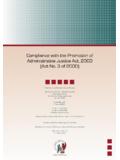Transcription of THE IMPACT OF THE OSD: DISSATISFACTIONS …
1 THE IMPACT of the osd : DISSATISFACTIONS raised BY aggrieved PUBLIC SERVANTS THROUGH GRIEVANCES Prof Richard M Levin Director-General Public Service Commission PRESENTATION OUTLINE INTRODUCTION THE OBJECTIVE of the osd THE IMPACT OF THE IMPLEMENTATION of the osd DISSATISFACTIONS EMANATING FROM THE IMPLEMENTATION of the osd IN THE HEALTH SECTOR DISSATISFACTIONS ARISING FROM THE AGRICULTURE SECTOR DISSATISFACTIONS EMANATING FROM THE IMPLEMENTATION of the osd FOR LEGALLY QUALIFIED EMPLOYEES CASE LAW ON THE IMPLEMENTATION of the osd CONCLUSION INTRODUCTION The Public Service Commission (PSC) has a constitutional mandate to investigate grievances of employees in the Public Service regarding an official act or omission, and recommend appropriate remedies to Executive Authorities In terms of the provisions of the Grievance Rules, 2003 and the Rules for dealing with grievances of SMS members, 2010, read with section 35(1) of the Public Service Act, 1994 (as amended), a grievance can be referred to the PSC for consideration in two instances, after the internal process has been exhausted and where departments fail to deal with the grievance within the prescribed timeframe The intention of this presentation is to briefly highlight the DISSATISFACTIONS of aggrieved employees relating to the implementation of the Occupational Specific Dispensation (OSD)
2 And the reasons for their DISSATISFACTIONS , as brought to the attention of the PSC THE OBJECTIVE of the osd The implementation of the osd is the result of a collective agreement Generally, the objective of the implementation of the osd was to introduce revised salary structures per identified occupation that cater for career pathing, pay progression, seniority, increased competencies and performance with a view to attract and retain professionals and other specialists The implementation of the osd also aimed to improve the Public Service s ability to attract and retain skilled people The OSD provides for two work streams, namely production and management, thereby providing for a flatter structure in comparison to the previous hierarchy of post levels Serving employees, who met the requirements of the osd , were translated in terms of the posts they occupied at the time of implementation of the osd for their specific occupation. Departments thus had to identify those posts on their establishments that met the criteria of the specific OSD, prior to its implementation.
3 THE IMPACT OF THE IMPLEMENTATION of the osd A comprehensive IMPACT study in all the sectors has not been yet been finalized. However, an IMPACT study on the implementation of the osd in the health sector was commissioned by the National Department of Health, but the outcome of the study is not yet public knowledge The PSC has received a substantial number of grievances relating to the implementation of the osd , specifically from the health sector and mostly from the nursing cadre. Investigations of these grievances received has enabled the PSC to form a broad picture of the IMPACT of the implementation of the osd . The presentation therefore attempts to provide a synopsis of the reasons for DISSATISFACTIONS and the findings of the PSC. DISSATISFACTIONS EMANATING FROM THE IMPLEMENTATION of the osd IN THE HEALTH SECTOR The majority of the grievances relating to the implementation of the osd , originate from the Western Cape Provincial Department of Health.
4 Since the implementation of the osd for the nursing profession, a total of 43 grievances were lodged with the PSC. Recognition of qualifications and previous experience The majority of grievances relate to the recognition of qualifications and previous experience in the process of translation to the OSD. Since the Health Professions Council of South Africa determines the criteria for the recognition of medical/professional qualifications, Professional Nurses, who occupied a post in a nursing specialty and who were in possession of a post-basic clinical nursing qualification, translated to the appropriate specialty post DISSATISFACTIONS EMANATING FROM THE IMPLEMENTATION of the osd IN THE HEALTH SECTOR Professional nurses who were not in possession of a post clinical nursing qualification, but who were appointed in a permanent post in a specialty unit and were performing the duties of the post on 30 June 2007, were translated as a once-off provision to the first salary scale attached to the production level.
5 In order to progress by means of grade progression, these professional nurses first had to obtain the required qualification. This led to dissatisfaction amongst professional nurses who did not meet the qualification criteria. Placement of employees In order to qualify for translation to the specialty stream, professional nurses had to be working in a specialty ward, the Intensive Care Unit. However, in smaller hospitals that do not have an Intensive Care Unit, a nurse would be allocated Intensive Care patients in a general ward. DISSATISFACTIONS EMANATING FROM THE IMPLEMENTATION of the osd IN THE HEALTH SECTOR In such a scenario, nurses tasked with taking care of intensive care patients, should be translated to the specialty stream. Departments interpreted the translation of nurses in this particular position incorrectly and translated them to the general stream, whereas they should have been translated to the specialty stream Incorrect translation of employees resulting in overpayments The PSC found in its investigation of grievances that in some cases, the dissatisfaction of employees arose from overpayments as a result of their translation to the OSD.
6 In four reported cases from the Mpumalanga Provincial Department of Health, it was found that the Department erroneously translated the employees to the rank of Professional Nurse under the Specialty Stream, whereas they should have been translated to the General Stream. DISSATISFACTIONS EMANATING FROM THE IMPLEMENTATION of the osd IN THE HEALTH SECTOR Although the correction of the incorrect translation by the Department was in line with the provisions of the osd , erroneous translation resulted in the employees being overpaid, in some instances, up to R110 000. In terms of the provisions of section 38 of the Public Service Act, 1994 (as amended), the Department is entitled to recover an overpayment resulting for wrongly granted remuneration, from employees. In the health sector, departments were requested during 2010, to review all translations to specialty posts and areas to apply the correct translation measures. In cases where it was found that nurses were incorrectly translated to a Specialty Stream, their positions had to be corrected and overpayments recovered where applicable.
7 From this communiqu , it appears that the incorrect translation of nurses was a common occurrence throughout the provincial departments. DISSATISFACTIONS EMANATING FROM THE IMPLEMENTATION of the osd IN THE HEALTH SECTOR Expectation to be translated in terms of the osd Reasons for DISSATISFACTIONS of employees in respect of the implementation of the osd further relate to their expectation to be translated to the OSD. In one case from the National Department of Health, a Deputy Manager stationed at Head Office, expected to be translated in terms of the osd for the nursing profession since he was in possession of nursing qualifications and was registered with a nursing council. In another case from the Northern Cape Provincial Department of Health, the aggrieved employee was appointed as an ambulance driver, and translated accordingly in terms of the osd . He however, desired to be appointed as a Team Leader and therefore, requested that his translation be amended to that of Team Leader.
8 These expectations are not justifiable as the employees were not performing the duties of the specific posts which they wished to be translated to. DISSATISFACTIONS ARISING FROM THE AGRICULTURE SECTOR Although the PSC received only a few grievances from the agriculture sector (7), scrutiny of the reasons for the DISSATISFACTIONS of these employees indicated dissatisfaction with the fact that they were not translated to the management stream, but were translated to the production stream. Placement of employees Prior to the implementation of the osd for Scientists and related professionals, the hierarchy structure provided for salary levels 6,7,8, 9-10 and 11-12. With the implementation of the osd , provision is made for the appointment of Scientists and related professionals in production posts where it is an inherent job requirement that the incumbent of the post must possess a qualification determined by the South African Council for Natural Scientific Professionals.
9 They also need to be registered as a professional. DISSATISFACTIONS ARISING FROM THE AGRICULTURE SECTOR The fields of practice provide for Scientists and Scientific Technicians. For example, incumbents of posts that were previously on salary level 11, were translated to the production stream as Control Scientific Technicians, whereas some of their subordinates who previously were on salary levels 6 to 8, translated to the management stream as Scientists. Although all employees received a financial benefit from the translation to the OSD, the impression is created that employees translated as Scientific Technicians, regard their positions as inferior to that of the scientists. Furthermore, the OSD provides that a person translated to the post of Control Scientific Technician Grade B (former salary level 11), may apply for a vacant post of Professional Scientist, a post which reports to the Control Scientific Technician, and was previously subordinate to the person on salary level 11.
10 This creates confusion amongst employees and ultimately leads to dissatisfaction. DISSATISFACTIONS ARISING FROM THE AGRICULTURE SECTOR Implementation and classification of employees The OSD for Engineering Technicians, Survey Technicians, Architectural Technicians, Draughtspersons, GIS Technicians and Scientific include posts falling within the occupational class: Geographer and Planner (GISc). In its investigation of a grievance from an employee in the Department of Rural Development and Planning, the PSC established that the Geographer and Planner occupational groups were classified as Technologist based on the minimum requirements for these posts. Since the stream GISC Professional, as contained in Resolution 3 of 2009 did not exist on the Department s establishment at the time of the implementation of the osd , the Department applied its discretion during the translation process and the Department of Public Service and Administration (DPSA) endorsed the translation.


















